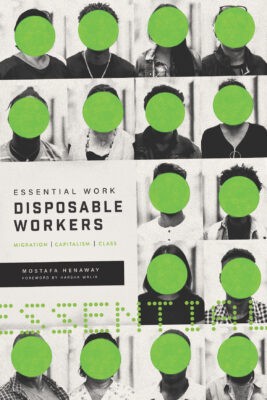Mostafa Henaway’s Essential Work, Disposable Workers: Migration, Capitalism, and Class unspools around a brutal paradox: how can a person be at once essential and disposable?
Prior to the pandemic, Henaway had already begun a book-length non-fiction project about temporary migrant workers. A longtime community and social justice organizer, his writing draws on both his academic research (he’s currently completing his PhD at Concordia’s Geography, Planning and Environment department) and his work at Montreal’s grassroots Immigrant Workers Centre (IWC) since 2007. In the early phases of lockdown, though, he noticed a shift in the conversations he was having with workers.

Essential Work, Disposable Workers
Migration, Capitalism, and Class
Mostafa Henaway
Fernwood Publishing
$27.00
paper
224pp
9781773632254
Canadian immigration policy, he argues, is designed to function like a faucet for cheap, fungible, precarious labour. It’s porous enough to let in a stream of racialized migrant workers when they’re wanted, but rigid enough that few can secure permanent citizenship and rights for themselves – most must leave when their help’s no longer wanted. This structure is buttressed by an ecosystem of services, like temp agencies that shield companies from formal employment and all the rights and responsibilities that come with that.
So the “essential workers” designation of the pandemic – given to the “angels” who mopped hospital floors and packed Amazon boxes and delivered poke bowls so that others could safely shelter and work at home – captures the absurdity that Henaway sees at the heart of Canada’s immigration policy, where the work is welcome, but the person who performs it is not.
“The work itself is essential,” he says, “but unfortunately, the way our immigration system is structured, we don’t actually consider these workers essential, right? Because if we did, they would have permanent residency. We would keep them.”
Inflection point
We meet up to chat about his book at an interesting time for organized labour, with high-profile strikes by SAG-AFTRA, the Writers Guild of America, the United Auto Workers, the staff at Ontario Metro grocery stores, and countless others dragging workers’ advocacy issues into the cultural foreground. I recount how, during a recent trip to Los Angeles, hotel staff across the city had raised a ruckus outside their workplaces each night, using “dirty rooms and nonstop noise” as a tactic to force their employers to negotiate. The summer of 2023 had begun to feel like an inflection point, as the discombobulations of pandemic-era work receded, leaving most workers feeling like little had changed for the better.
“People feel like their backs are against the wall, and they are organizing again,” Henaway says. “I think it’s really beginning to come to a breaking point. Everybody is watching the dreams of new liberalism completely fade.”
He points to how the rupture of COVID isolation enabled people to step back and consider what they wanted in their lives. Many, he says, realized, “I could just be as effective without someone breathing down my neck, and be closer to my family and have a more humane life, as opposed to doing all the things I did before to make someone obscenely rich.”
The problems of professionals pushing back against return-to-office mandates, or blue-collar workers fighting stagnant wages, might seem distant from the struggles for basic human rights and safety faced by the migrant workers who organize through the IWC. But Henaway reminds that work is often the place where politics intersects with people’s day-to-day lives.
“Labour is the thing that people need the most in their lives,” he says. “It’s hard to shrug off because it’s the thing that you do eight hours a day, so you want to feel like a decently respected and dignified human being when you’re finished.”
How the world works
Essential Work, Disposable Workers stands out among books about labour because it’s so heavily populated by, well, workers. Henaway is careful to position the people he organizes with as vocal agents in their own lives, striking a tricky balance of revealing the abjection of their circumstances while showcasing their power and resilience.
“The vast majority of the book is based on people I’ve worked with,” he says, a writing strategy that reflects an approach to organizing grounded in using individual support to build collective campaigns.
“You have to be willing to be uncomfortable and be in spaces and communities that you’re not familiar with,” he continues. “It’s a lot of relationship building, it’s a lot of being patient with people. It often takes a long time for people to even express themselves.”
Organizing temporary foreign workers poses challenges beyond workplace-based activism. Many people, for example, work in private homes, or have contracts framed by shady temp agencies. There are often language or cultural barriers between workers, and, with working papers in question, losing allies to deportation or repatriation is a constant. But then again, as Henaway says: “Organizing is always messy.”
Bringing the fight to temporary workers
With the book, he aims to reach other organizers, to share what he’s learned in over fifteen years of working with some of Canada’s most precarious populations. He’s concerned that the left unfairly overlooks low-wage, temporary migrant workers, assuming that they’re too hard to organize. Instead, he points to the value of community resources like the IWC, which meets people where they are in the community and provides a safe space for their activism. He also reminds readers that there’s really no way to separate migrant workers’ plights from the larger structural forces at an international level. “These are global issues – they’re not local issues,” he stresses. “They’re global issues.”
Take, for example, the international remittance system – whereby temporary workers abroad send a portion of their pay back home to family. These have become core elements of the economies of nations dependent on labour exports like the Philippines, where about 10% of the total population lives and works abroad.
“Remittances,” Henaway writes, “are increasingly utilized to maintain the integration of low- and middle-income countries in the world economy.” These payments are frequently used to service foreign debt, he notes. This relationship effectively indentures labour-exporting countries while enriching the nations people migrate to, a structure he likens to “debt imperialism” funded by low-wage workers.
“It’s structural. It’s in the DNA of this system of people that are being propelled to migrate, and the journey is now becoming starker and starker,” he tells me. “And to say that our house is full and we’re going to put up the drawbridge is not a solution.”
In Canada, he finds that pathways to citizenship depend above all on one’s value as a worker, as an economic contributor. “While fighting for better working conditions is important,” he writes, “the most important struggle is for status.” With global movement flattened to economic migration, for the workers that Henaway organizes with, the labour and legal questions are inseparable.
“You know inherently that none of these issues are individual – they’re completely collective,” he says. “Building a more equitable society is what they’re demanding. And to me, that’s really what they’re organizing about, even if they don’t see it in that way. It’s about something much deeper.”mRb







0 Comments